-
How did The Beach
-
get started as a film project? How did it all
begin?
-
I think it was in summer of 1994 I was on a beach in the north of New
Zealand with a very close friend. And she'd been a very close friend of mine
for at least ten years. We spent a lovely day in the sun, and she told me some
things about her background that I was quite shocked to hear-and quite shocked
that in all the intervening years of intimacy that we had never touched on. And
it really just brought the story to my mind at that point. And then it took two
years from then to put myself into a position to be able to do it.
-
Does that mean that you asked someone to do the writing of the script, but
you laid out the framework of the story?
-
I did.
-
Do you recall any ways in which you changed the original story as the film
project developed?
-
It's very hard to answer that. What I can say is that as a filmmaker, I
will probably always be the originator of the story per se. But that's a very
far cry from having a script that you can make into a film. And to have an idea
for a film, even if the idea involves quite a lot of the detail, and even the
emotional play of it all and what it is you want to say, it is still a million
miles from having the skills of a writer, to actually communicate those ideas
to the screen. And I think that's the great conflict a lot of directors have.
If you're lucky enough to work with a really gifted writer then you're lucky,
because so much can be brought to your work and your idea in ways that you
can't even dream of, if you're really lucky. I think that's what you search
for, that kind of collaboration.
Frances Edmond is an actress, whose work in New Zealand is well respected, and
she's done a lot of work in New Zealand over the years. In the last few years,
she has made the move to writing. And I think this is her first film script,
and since then she's done other work. Our working relationship is fostered by
friendship. It's also fostered by shared politics. And similar references to
the film industry. We also have children who are the same age, and I think that
has helped us enormously.
-
Would it be indiscreet to ask more about the politics you share?
-
No, not at all. I think we're both quite feministic in our thinking.
We're also very interested in the way that feminism is changing. I don't think
we're living in the time of the hybrid man so much any more, which was more the
political rhetoric of feminism when I was a younger woman. I don't believe in
that any more. I think that the challenge is to change the working place, to
accommodate what women can do. And what women do is so far different from what
men do. I don't think we basically use what women can really do because in many
countries, we don't support them into the workplace sufficiently. In so many
ways. For example in job sharing, tax assistance for child care. Denmark's a
very sophisticated country in that kind of way, but in New Zealand there is no
assistance at all for a woman to get back to the work place.
-
What about women in film-making? Are conditions good for women film-makers
in New Zealand?
-
Yes and no. In some ways, yes, very much so. But on the other hand, we have a
very young industry in New Zealand. The real thrust of our industry didn't
really begin until 1976 with the film called
Sleeping Dogs. And on that
film I was the production assistant. It was directed by Roger Donaldson.
I think that in the first decade of film-making in New Zealand, there was an
environment of benign chauvinism - which doesn't exactly assist you, as a
woman, to explore your own ideology and ideas.
Certainly, on the face of it, we have a lot of young women directors in New
Zealand who are doing some really interesting work. And I don't think that
their progress is held up particularly by the fact that they are women. But I
think that there are problems...
You look at the films that we see in mainstream cinema. I truly don't believe
that those films are directed to a female audience. And I find that deeply
irritating, because woman have American Express cards, they have got incomes,
we're a financial demographic that ought to be respected more. But if you look
at the amount of money that Hollywood spends, the machine spends on
film-making, and how much of it acknowledges the female audience and
their
particular tastes for cinema, I find that absolutely overwhelming.
-
Could a man have made a film like The Beach
, and if so, would it have
been a very different film?
-
I think you'd have to say it would have been different. The key thing of
The
Beach for me is about suggesting to women that perhaps we should be more
aggressive or more answerable to what we see. The reality is that in New
Zealand, women live in the communities and on the streets and in the houses
next door to where a lot of violence happens, directed towards women and
children. They are very often the people who see it first, who see the signs of
it first. And they are also very often the people who hide behind notions of
the privacy of the family... "This is none of our business"-cliché... to
not do anything.
In making
The Beach, I'm raising the question: Should we not be perhaps
a little bit more [aggressive] sometimes? In the case of the woman character
Ann in
The Beach, she's a grown-up, she's 40-odd. Yes, she's a victim,
and yes the violence directed towards her is tragic, but even more tragic is
the fact that this child is growing up viewing it. And he's being deeply
influenced in how he turns into a young man and how he behaves as a man. There
you have to put your foot down. No matter how sorry you are for Ann, she is a
grown-up. But this child is truly a victim. I think that often, women don't
show much courage or conviction in this area.
-
So the film then in a sense is proposing Margie as a model?
-
It's a catalyst of thought. It's a short film, and I had hoped that it
would simply raise a few questions, make you think about it. I find Margie's
behavior perfectly acceptable. But I don't think it happens very often.
-
Thinking not only about what you say in the film, but also the way in which
you say it, I would like to ask whether there is such a thing as a feminine
style of filmmaking?
-
I really don't know. For a start, what feminist filmmaking there exists,
gets screened [only] in film festivals. You know, you don't have access to it,
in the same way that the world as an audience doesn't have access to some of
the best independent films made. That's the tragedy. I saw a fantastic film
recently, called
Gobay, from Iran. A wonderful film. But you know, they
just don't get seen. The cinemas that we have, the exhibition places that we
have, are so busy making the money back for
Independence Day or
whatever. It's that machine. And unfortunately, not only does it dictate what
we see, but it also dictates what we don't see. So I haven't had access to
feminist filmmaking. I haven't seen enough of it to actually say if there is
indeed such a thing as feminist forms of filmmaking. I don't think there are.
-
Did you use professional actors in The Beach
?
-
Very professional actors. Because I've worked in the industry for so
long, I think that's one of the things I feel most strongly about. You work
with the best people you possibly can whenever you can. And Donogh Rees and
Elizabeth Hawthorne are the best actresses New Zealand could give me to work
with. Both of them have done some extraordinary work in their past. And the
process of working with them is so professional, it was a pleasure.
-
Do you have a particular policy in directing actors?
-
This is the first film I've made. Since then I've made another film
[
The Bar], so what policy I have is fairly unevolved, it's developing. I
think that ultimately, I could spend the rest of my filmmaking life learning as
much as I can about acting and directing actors. But still, it's not what I do.
I don't act. I'm not a performance animal myself. And I think my instincts will
always be to spend as much time as I possibly can on casting. Try and cast it
wisely, in certain cases, casting to character, try and get the best girl and
then try and communicate the film that I have in my mind. Because that's
something that the script cannot always tell an actor. It's the nuance of what
you're trying to create, it's the point you're trying to make, how you're
trying to make people feel. Try and communicate all those things as clearly as
you can, and then I think, let them do what they do. Try and support what they
do, the process of what they do, with the atmosphere that you create around
them - the tangible things to help them work. After that, having given them
some reference of who you are, just communicate what you see.
-
Did you thoroughly storyboard The Beach
before shooting?
-
Fairly thoroughly. We shot this on a beach in the north of North Island
in New Zealand, and we had three days to shoot it. And those three days really
turned into about one-and-a-half days because of weather. So it's pretty much
like anything that you do. You know, you go out with a definitive view of what
you're going to do, but instantly, you start modifying. You're working on your
toes, and your reactions and your instincts. To start with, the first part of
the film was much more developed. There was also a piece of dialogue before. At
the start of the two women's dialogue there's a hunk that I cut out.
-
What did they talk about?
-
I'd have to refer to the script. I think basically, they set the tone of
who they were. The fact that they were a very middle class group of two
families who are spending a day together. And establishing who's children were
who's.
- The Beach
doesn't start with a shot of the two main characters. They are
introduced very gradually. First you show a bit of landscape near the beach.
Then there's a tracking shot along the beach, and we see the two girls talking,
with the other father nearby. And David playing cricket and so on. And then
finally we get to the women. I imagine it must have been deliberate on your
part to save our introduction to the main characters until a point well into
the film.
-
I think that the whole narrative set-up that was involved in those shots
was to say that it's the hottest day of summer. This is a day when the telling
of secrets can happen. To try and give the audience a memory for themselves of
what that hottest day in the summer involves. It's the fact that you've got two
fathers on the beach, minding the children-happily doing so, each in his own
little world.
-
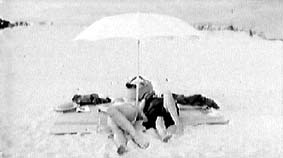
-
And you've got these two mothers off in a very particularly delicious world of
conversation and lying and sleeping. Most people who have young children would
look at that scenario, I think, and relate to it quite strongly. The children
are happy, the fathers are happy, the mothers are asleep, then having
incredibly languid conversation. And in that atmosphere, this truth came out.
I was also trying to show that these people know each other really well.
They're old friends. Which is of course why Marie is so angry with David. She's
incredibly angry with him and rightly so, he's a very old friend. It's hard to
know who she's more angry with: the friend, for not telling her, or her other
friend for doing this. So I was trying to set the scene of the relationships
and the day.
-
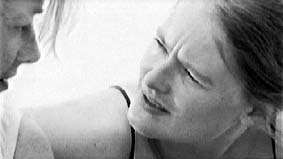
-
-
The affection and intimacy of the two women is expressed nicely when Marie
runs her hand down Ann's back. Is there a flicker of a hint of an erotic
relationship between the two women?
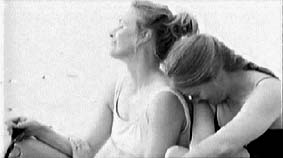
No, I don't think so. And that's the kind of subtlety in detail that
[screenwriter] Frances Edmond brought to the script. I thought it was a lovely
gesture and it's certainly something of which I'm capable when amongst the
close group of women that I have around me. And again, it's the day. A day like
that does bring out the sensual in all of us. So I think it's a reflection of
the mood as much as anything else. But no, I never saw it as a reflection of
the nature of their relationship.
-
The two little girls whisper to each other and the two adult women also talk
to each other. There are no adult males that interact, the only interaction
between males is playing cricket. I assume that this is part of your picture of
gender specific styles of interaction?
-
-

-
Yes it is. It is an observation of that. But in the same breath, it is an
observation that is attached to telling this particular story. So it's
appropriate to include this observation. And if I've treated the male gender
here with less attention to detail than I might have, it's because that's how
they are in the story. It's not a story about them.
And in trying to find some action for the little girls to do - because we were
working fast and hard, between clouds... I'd watched them for some time, and I
had something in my mind. We had it all organized: they were going to make
beautiful sand castles and there were shells everywhere. We were totally set up
for something else but we didn't have time to do it. And I had been watching
them, and that's what they were doing. And again I think that most people who
have children, or have been around children, could relate to it... Yes. That's
exactly what they do. Maybe it's the start of that inner world that I think
women do have and that does start when they're little girls.
-
There's relatively little dialogue in the film, and relatively little
action. But tremendous depth. At least that's the way I see it. Does this
correspond to your sense of the film?
-
That was the hardest thing to achieve. The script that we shot was nine pages
long. When Frances and I first started working on the script, it was about
twenty pages. And if we went to six drafts, it was to try and actually pare it
down... For me as a film director who would like to continue to direct films,
this is the greatest challenge: to make films which involve naturalistic and
perceptive and honest dialogue. I think it's also the hardest thing to do.
-
You were kind enough to send me a copy of The Bar,
which is a very
different kind of short film. Can you give me some of your thoughts on
storytelling in the short film in general?
-
The thing about the short film format is that it is less beholden to certain
narrative conventions than a feature film is. There's something about the
length of the feature film... Well you simply have to be more beholden to the
conventions of narrative, whether it's a three-act structure, or whatever. I
think for the time that I'm working in a short film structure, which tends to
be under a reel, say under fifteen minutes, you're not so beholden to those
conventions. With
The Beach, because it was a very narrative,
straight-forward, driven story, it lent itself to a three-act structure.
The
Beach, from my point of view, is a very conventional piece of filming. I
think it works in that convention. But I'm very challenged in my own
development to explore these conventions. I don't actually like them. I hate it
when I read something that sets down the set of ground rules for how the film
must be structured. I'm also intensely irritated by a lot of films that I see
which just seem to me to be processed through a Macintosh program. You can
almost graph it! There's x amount of this component, there's x amount of that,
and these things happen at certain points. I find that irritating. I don't know
if I have a knee-jerk reaction against it , or what it is.
So the time that I'm working in short film, I am very driven to explore it for
myself.
The Bar has no narrative structure at all. It's a situation of
intercepting between six or seven conversations. One of the things I feel
strongly about is that a film should be paced by the development of character,
and that character development moves the narrative. And it shouldn't be paced
by just the narrative, because I don't think that life's like that. What
happens to us in life happens to us because of the people we are, and each of
us reacts to different things in a different way. That's very individual. So in
reading a story or in watching a film, what's interesting is to see how someone
reacts and how that reaction has moved them irretrievably down a certain path.
That's what makes us so different. It's something that I don't know enough
about on a personal, instinctive level. I haven't learned to really judge my
own instincts...
The Bar was for me very personal. It's a very indulgent film in a way
that
The Beach isn't.
The Bar really for me was about working
with six different writers and a large ensemble group of actors, and working
quite fast and quite instinctively. In that sense it was a joy. And it
definitely has encouraged me in my own thinking about film structure.
-
Do I understand correctly that The Beach
and The Bar
are two
parts of a trilogy...
-
I'd like to make one more short film. The next one's called
The Funeral.
It's basically about the death of an AIDS victim. It's a personal film, and its
partly the look at that kind of human condition that exists in isolation, in
rural settings... I read a book-Jane Smiley's
A Thousand Acres-some
years ago, which really talked to me about this. I'm quite intrigued by
landscape and people's relationship to it.
For instance, coming to Denmark, as a sort of hybrid Dane... One of the things
that is intrinsic to me about it is that I relate to the landscape in such a
fundamental way. I feel so at home here. And I think people have those kinds of
relationships.
The Funeral is an exploration of that kind of condition
and also of all sorts of others. With
The Funeral, I am trying to make a
film that is an exercise in telling a story in landscape and imagery that runs
in parallel to dialogue and characterisation. Which I think
The Beach
does a little bit in the sense that the setting that I chose for
The
Beach and the place that the film exists in, underpins that story.
So with
The Funeral, I'd like to work it more in parallel. The main
piece of imagery that I have is an enormous river that runs through the middle
of the North Island of New Zealand called the Waikato River, which is big and
powerful and brown. And in parts it's surrounded by very flat landscape. I want
to work with wide screen, and again, it's an exercise, trying to learn
something and trying to feel more comfortable with certain aspects of your
skills. And to try and understand your own abilities a bit more for a large
project.
-
When we first talked about The Beach
on the phone, you mentioned the
overexposed look of the film. What were your reasons for choosing that look for
the film?
-
It was simply the fact that the only reason the story could happen...
Remember these people have known each other for a long time, so this domestic
abuse has been going on for years within the confines of a close relationship
and not been seen. And it's only on the hottest day of summer that this secret
was disclosed. So it was really important for me that the audience could feel
this sense of heat. And that's why I chose that look.
-
Was that done in the camera or in the lab?
-
We were a victim of the weather. We didn't have the hottest days of
summer, unfortunately. So the film was exposed normally and overexposed in
printing by two f-stops.
-
The final shot of the film is wonderful. For me, it gives the viewer a
chance to reflect on the boy's experience. It reminded me a little of the end
of Truffaut's The 400 Blows,
only your boy isn't looking at the public,
he's looking at his mother. Do you remember your thoughts on planning that
final shot, and what purpose you wanted it to fulfill in the film?
-
-
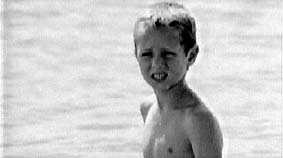
-
It was pivotal, and I always saw it pretty much that way. I was influenced, in
terms of film reference, by Roman Polanski's
Knife in the Water, which
has an image there of the male character who's in the water, he's completely
surrounded by water, and it's just always stayed with me the way some shots do.
-
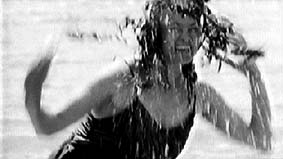
Again, films... You can plan them down to the finite detail but they don't
happen like that because it's such an organic process. And you have to be able
to be fairly fluid in your thinking. We didn't get that shot in the three days
that we had to shoot at this location. We just ran out of weather. So we got it
at a beach quite close to Auckland and it was a cheat and we got it with the
cameraman and an assistant and the two actors. It's a miracle it works as well
as it does. And I think it works as well as it does because of Donogh Rees, the
actress who plays the Margie character, who had that lovely business with the
seaweed. Which is so humanizing. And I thought: that's not my direction, that's
Donogh as an actress working. And I think that's what you get from working with
actors whose intellect and ability is so evolved that they bring that kind of
detail to it. Because that seaweed business distracts you totally from the fact
that it's not a complete match to the earlier location. And it's also such a
human thing to do. It's what you
would do, remembering that this kid has
just seen a piece of violence... It's exactly what you would do, you'd
distract, you'd play...
-
Despite that distraction, there is this very long, contemplative look. Was
that the final shot in all of your versions of the script?
-
Always. We'd come back to that face. And it was just a case of how long
you could sit on it, really. How long a performance you could get from Charlie
Baird who played the boy. He's not an actor, and I thought he did very well to
hold it as long as he did.
This was my first film, and I chose to do it with my friends and my family and
partly because I was funding it myself, I couldn't really do it any other way.
But it's in trying to get a performance out of a ten year old child... I chose
to do it with a child I knew really well. I don't know if I'd do that again,
but it worked for me.
On
The Beach, I had all my children with me and Donogh Rees's children
were there and were in the film, and which is partially a practical thing of
using what we had there. Also it was a great way of working... It was a very
indulgent way of working, but it shouldn't be so unusual for women to be able
to work like that. And for women to be able to work effectively and efficiently
means that your children have to be looked after, and preferably they ought to
be close to you. Because filmmaking is such an intensely absorbing process that
unless they're close to you, they just don't get anything of you. And I think
part of the nature of the filmmaking process is its obsessiveness. You become
very obsessed. But this is also something that is good for your children to see
because it gives them a context to understand why sometimes you aren't there.
I guess I've decided that it's going to be easier for them to have two very
obsessed filmmaking parents if they can be part of the process.
It's unusual for that to happen, and it shouldn't be. And those are the things
that make it difficult for women.
-
Do I understand it correctly that your husband is also a filmmaker?
-
Stuart [Dryburgh] shot the film.
-
Oh, that's your husband?
-
He's the father of my three children.
-
And he also shot Once Were Warriors
?
-
And
The Piano.
-
-
Now I'm beginning to see how things fit together.
-
And I think that
The Beach is a beautiful looking film. It's
pretty much a reflection of Stuart, whose a very gifted cameraman. I'm very
lucky to have that kind of collaboration under my own roof. But it's also very
much the nature of our life together. And it always has been. Filmmaking has
always been a key ingredient to the life we've had together.
-
You use music to frame The Beach.
There's music at the very beginning
and then music comes in again at the end. Was it your thought from the
beginning, to frame the film in that way?
-
I find that the moment I start thinking about an idea for a film, very
close behind that idea for a film is the fabric for the music. It's usually
just a sketch-the
kind of music I wanted. I knew that I was keen to have
a piece of cello music. Or something like that. And I listened to virtually
everything that I possibly could and at the end of the day, the Bach cello
concertos were what came closest to me. And the Fauré requiem with the
boy's soprano piece was the piece for the end. And these two pieces of music I
gave to Keith Ballantine. And that's very much how I work with music. It comes
to me very fast and it's as much part of the fabric of the film as your sense
of art directions for it, as your sense of photography for it. It's such an all
encompassing thing... One of the fantastic things about film, and why I'm so
drawn to it, is that it touches on the things that I'm so interested in:
architecture, photography, music, style, look, writing, performance. But all of
those things get developed in tandem as you go up.
-
Are there any things that I should have asked you about and didn't? Any
things you'd like to add about The Beach?
- I really like
The Beach. I think I was really lucky that my first film
is fairly articulate-it's clear and concise. I think that's lucky. I'll be very
lucky to make another film in my career which I have that kind of emotional
response to. And when I say that, it's not that I think it's an excellent film,
it's just that I can look at it and feel good about it.
Making a film like that has so much to do with the collaborations. It's
Stuart's photography, it the wonderful performances from Donogh and Elizabeth,
the music from Keith Ballantine, and the editing by David Coulson. The
experience of making my first film has certainly consolidated all my instincts
from working in film for twenty years, which is that the sum total, the
collaboration... you know, one person's brilliance doesn't overcome a set full
of mediocrity, and that part of the drive is to surround yourself with people
who really challenge you-even if that makes you feel uncomfortable, because
you're moving out of an arena that you feel confident in. If that happens, so
much the better.
Copenhagen, 24 November 1996





